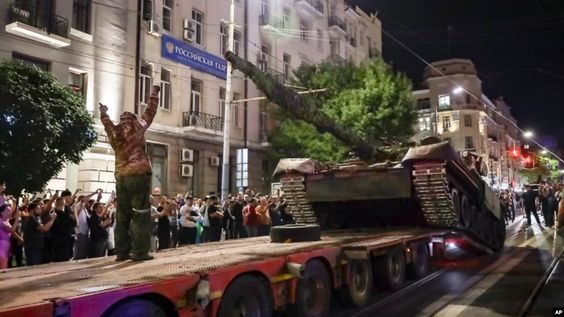World
US Consults with Allies but Proceed With Caution as Russia Crisis Develops

While officials waited to see how Yevgeny Prigozhin and his private Wagner army’s armed uprising would turn out, the United States and its allies held intimate discussions behind closed doors.
U.S. officials carefully avoided making direct comments on what some stressed was an internal Russian matter as the rebel army prepared to march on Moscow before announcing a surprising retreat, while Moscow advised them to keep out of the battle.
Amid worries that Russian President Vladimir Putin’s hold on the nuclear-armed nation may be eroding, U.S. President Joe Biden spoke with the heads of France, Germany, and Britain.
In a readout of their conversation released by the White House, it was noted that they spoke about “the situation in Russia,” which erupted on Friday after Prigozhin announced a challenge to the Russian Defense Ministry, took over Rostov-on-Don in the south, and sent an armed column toward Moscow, before making a shocking U-turn on Saturday.
According to his spokesperson, Defense Secretary Lloyd Austin also had conversations with his colleagues in Canada, France, Germany, the United Kingdom, and Poland.
A symptom of the significant worry in the capital of the United States was the cancellation of a trip to Israel and Jordan by General Mark Milley, chairman of the Joint Chiefs of Staff.
After speaking on the phone with his counterparts from Western Europe and Japan, U.S. Secretary of State Antony Blinken made a commitment to “stay in close coordination,” according to State Department spokesman Matt Miller.
Josep Borrell, the top diplomat for the European Union, refrained from making any direct comments on what he called a Russian internal matter.
However, he said that in preparation for a Monday meeting of the EU Foreign Affairs Council, he had activated the EU crisis response center and was coordinating officials in the union.
He continued, “Our assistance to Ukraine remains unabated.”
‘Gift’ for Ukraine
Beyond that, though, officials remained silent, perhaps waiting to see what would transpire in Russia’s gravest security crisis in decades.
To discuss the Moscow crisis, Biden and Vice President Kamala Harris met early on Saturday with Austin Milley, Director of National Intelligence Avril Haines, and CIA Director William Burns.
According to a U.S. military source, American officials must be careful with their words because they do not want to give Putin or anybody else a reason to hold Washington responsible for the situation.
Moscow strongly advised the United States and its allies to hold back.
The foreign ministry issued a statement in which it said that “the rebellion plays into the hands of Russia’s external enemies.”
“We warn the Western countries against any hint of possible use of the domestic Russian situation to achieve their Russophobic goals,” it stated.
Meanwhile, Belarus, an ally of Moscow, referred to the revolt as a gift to the West.
In Kyiv, Deputy Defense Minister Hanna Maliar shared the notion by referring to the uprising as “a window of opportunity” for Ukraine’s armed forces.
Analysts concurred, with James Nixey of the London-based Chatham House think tank, an authority on Russia, telling AFP that Ukraine will probably try to take advantage of the circumstance.
Atomic weapons
As Ukraine continues its counteroffensive against invading Russian soldiers in the country’s east and south, Western allies were also interested in whether the unrest inside of Russia will be advantageous for Ukraine in any way.
Experts say it is crucial to watch out for any attempts by Prigozhin’s rebel troops to seize control of Russia’s nuclear arsenal, especially tactical nuclear weapons.
According to former White House National Security Council expert on Russia and Eastern Europe Alexander Vindman, “This is an emerging danger and is precisely what policymakers most fear, a loose-nuke scenario.”
Since the fall of the Soviet Union, this worry has troubled American officials, he claimed.
When asked if there had been any communication with Moscow over the security of its nuclear arsenal, the White House remained silent.
While things are still in flux, Nixey advised the West not to look to Prigozhin as a hero or assume that the Russian elite will shift against Putin and toward him.
In their own minds, many Russians would view Putin’s invasion of Ukraine as a “dreadful mistake,” he suggested.
However, “that doesn’t translate into supporting Prigozhin, because of his maverick nature,” Nixey said to AFP.
Regarding Kyiv, he claimed that Prigozhin’s uprising did not signal the end of their conflict.
He is hardly the Ukrainians’ knight in shining armor, despite the fact that they will be happy that it happened and will be eager to take advantage of it on the front lines at the moment.
